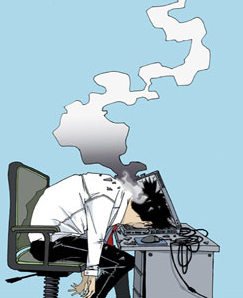Burn Out
Burn out
Burnout is a state of physical, emotional and mental exhaustion caused by long term involvement in emotionally demanding situations or situations that fail to produce the expected reward. Burn out can happen to students as well those who are working in stressful conditions.
Burnout mainly strikes highly-committed, passionate, hard working and successful people, and it therefore holds a special fear for those who care passionately about their studies, careers and about the work they do.
Exhaustion and long-term stress contribute to burnout, but they are not the most destructive parts of it. The real damage of burnout comes from the sense of deep disillusionment that lies at its heart.
Many of us get our sense of identity and meaning from our work. We may have started our careers with high ideals or high ambitions and may have followed these with passion. This is easy to see in doctors and teachers, who may have a strong desire to help other people to be the best that they can be. Good lawyers may have a passion for justice. Others may be ambitious for promotion or may want to make a difference to people or organizations in some other way. In all of these cases, these ideals can drive a highly motivated, passionate approach to work.
It is not surprising that people showing this level of resilience and commitment to their work are often spectacularly successful. The problem comes when things become too much. Perhaps exhaustion sets in because people have been working too hard for too long. Perhaps performance begins to slip because of this. Perhaps the problem being solved is too great, and the resources available are too meager. Perhaps supportive mentors move on and are replaced by people who do not appreciate the heroic job that is being done, or do not subscribe to the ideals that drive performance. Perhaps co-workers or team members make just too many emotional demands, or people being served prove to be ungrateful and difficult.
Being proactive, energetic, committed people, it is likely that we respond to obstacles like these by increasing our commitment and hard work. However, in these circumstances it is possible that these efforts may have little or no impact on the situation. This can be where burnout begins to set in. As we get less satisfaction from our jobs, the downsides of these jobs become more troublesome. As we get more tired, we have less energy to give. If our organizations fail to support us, we can get increasingly disenchanted with them. We become increasingly disillusioned.
In extreme cases, we can lose faith completely in what we are doing, and what our organizations are doing, becoming cynical and embittered, and feeling that our ideals and meanings in life count for nothing. This is full-scale burnout.
More about Burn Out and how to prevent it

Anyone can become exhausted. Burnout happens when people who have previously been highly committed (to studies or a job) lose all interest and motivation. Sadly, this can spell the end of a successful career. While exhaustion can be overcome with rest, a core part of burnout is a deep sense of disillusionment. Therefore, burnout affects those who have deep sense of responsibility and commitment and is not experienced by people who can take a more cynical view of their work.
Symptoms of Burnout
Physical symptoms can include physical fatigue, frequent illness and sleep problems.
Emotional symptoms include disillusionment with the job; the loss of a sense of meaning and cynicism towards our organizations or clients; feelings of helplessness; frustration of efforts and a lack of power to change events; strong feelings of anger against the people we hold responsible for the situation; and feelings of depression and isolation.
Behavioral symptoms can include increasing detachment from co-workers, increased absenteeism, an increased harshness in dealing with our teams, marked reduction in our commitment to our work, and increased alcohol consumption. These symptoms reflect exhaustion and a loss of satisfaction with work.
